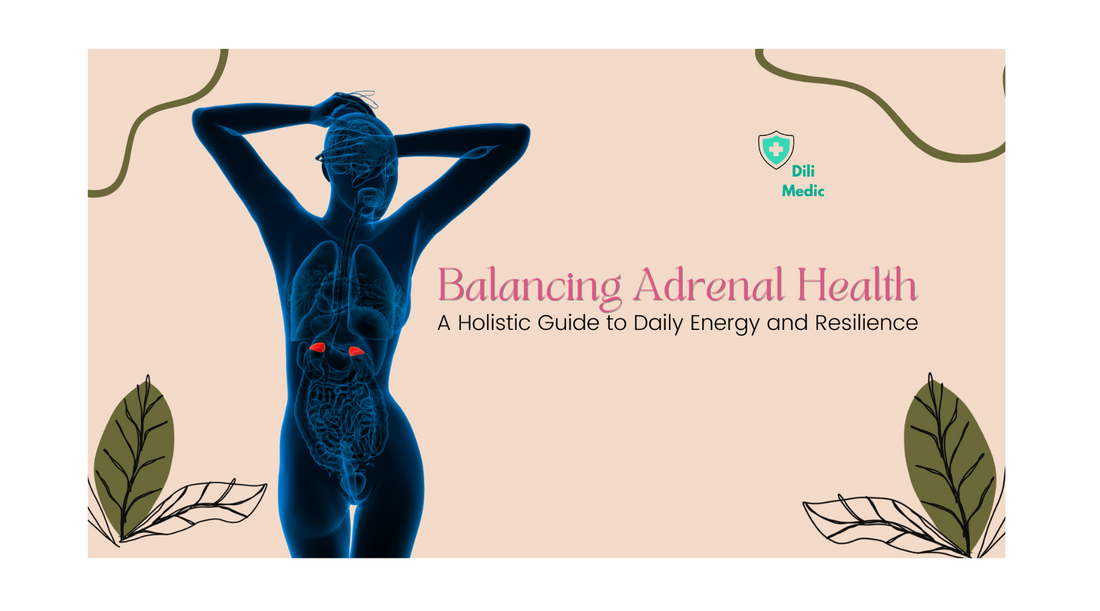
Mastering Adrenal Balance: Boost Daily Energy and Resilienc
Share
The adrenal glands play a central role in managing energy, stress response, and hormonal balance. Through mindful routines, nutrient-rich support, and lifestyle choices, it is possible to nurture adrenal health and improve everyday resilience without intense interventions.

Key Takeaways:
|
The adrenal glands influence how the body responds to stress and regulate energy |
|
Symptoms such as fatigue, brain fog, or cravings may reflect adrenal rhythm changes |
|
Gentle routines that support sleep, nutrition, and mindfulness may encourage adrenal balance |
|
Herbal and adaptogenic support can be part of a broader self-care approach |
|
Long-term consistency plays a vital role in maintaining adrenal well-being |
Understanding Adrenal Function and Energy Balance
The adrenal glands are small, triangular-shaped organs located on top of the kidneys. They help regulate essential hormones such as cortisol, aldosterone, and adrenaline. These hormones assist with blood pressure, stress response, immune support, and energy regulation.
Ongoing physical, emotional, or environmental stress may influence adrenal signaling. Practicing daily habits that align with natural hormonal patterns can help maintain energy, focus, and rest.
Read more on adrenal health from Cleveland Clinic
Signs That May Reflect Adrenal Imbalance
Certain symptoms may indicate a need to restore rhythm and balance:
- Mid-day energy crashes or difficulty waking up
- Cravings for salt or sugar
- Mood fluctuations or low motivation
- Disrupted sleep, especially waking in the early morning
These signs may have multiple contributing factors, and noticing patterns is often the first step to making supportive changes.
Gentle Routines for Adrenal Balance
Daily Rhythm and Sleep Support for Adrenal Health
A steady sleep routine supports the natural cortisol rhythm, which typically follows a cycle of rising in the morning and tapering by evening. Exposure to natural light early in the day and limiting bright artificial light at night may help regulate this process.
Consistent sleep timing, calming evening rituals, and minimizing stimulating inputs before bed can contribute to more restorative rest and reduced stress load on the adrenal system.
Nutritional Support for Adrenal Function
Nutrient-dense meals play a key role in supporting adrenal balance. Foods rich in vitamin C, magnesium, and B vitamins may help with energy production and nervous system regulation.
Balanced meals with protein, complex carbohydrates, and healthy fats can contribute to more stable blood sugar levels throughout the day. Staying hydrated with mineral-rich fluids, such as coconut water or lightly salted water, may further assist in maintaining adrenal resilience.
Explore adrenal-supportive recipes →
Herbs and Adaptogens That Support Adrenal Wellness
Several plant-based remedies are traditionally used in herbal wellness to support the body's stress response. Herbs such as ashwagandha, rhodiola, holy basil, and licorice root have been studied for their calming and regulatory effects on energy and hormonal rhythms.
These botanicals can be integrated into daily routines through teas, tinctures, or capsules under professional guidance. Each herb may offer unique benefits depending on the individual’s needs and constitution.
Read herbal monographs on adaptogens →
Mindfulness and Nervous System Practices
Intentional breathing, gentle meditation, and regular mindfulness routines may help modulate the nervous system and reduce perceived stress. These practices can assist the body in maintaining balance and promote a sense of calm throughout the day.
Short pauses during busy hours, combined with breath awareness or grounding techniques, may help settle overstimulation and improve emotional clarity.
Gentle Movement to Support Energy Flow
Low-impact physical activity, such as walking, yoga, or mobility flows, can help support circulation and overall vitality without excessive strain. These forms of movement may also encourage mental relaxation and support hormonal regulation through consistent practice.
Stretching, slow-paced activity, or nature walks may be especially helpful in creating moments of pause and connection with the body.
Daily Lifestyle Habits that Support Adrenal Balance
Morning exposure to sunlight, regular meal timing, and a digital wind-down routine in the evening may all contribute to rhythm and energy stability. Establishing boundaries with digital devices, reducing background noise, and creating quiet spaces may support mental clarity.
Other practices that may offer support include reducing caffeine in the afternoon, limiting multitasking, and introducing pauses between tasks to reduce mental load.
Functional Testing and Professional Insight

Salivary cortisol panels, DHEA measurements, and other functional lab tests may offer information about adrenal patterns. These assessments are often used by integrative practitioners to evaluate daily hormone rhythm and identify areas of focus.
Collaborating with a qualified healthcare provider can help in tailoring an approach that supports adrenal recovery while accounting for personal health history and current lifestyle.
Explore integrative adrenal testing →
Building Long-Term Resilience
Daily habits practiced consistently over time may influence long-term adrenal health. This includes nourishing meals, emotional regulation strategies, regular movement, quality rest, and boundary-setting with external demands.
Supporting the body's energy systems with patience and self-awareness may help maintain internal balance and strengthen resilience.
Frequently Asked Questions
-
What do the adrenal glands do?
They produce hormones like cortisol and adrenaline, which help regulate energy, stress response, metabolism, and blood pressure. -
Can food support adrenal balance?
Yes. Nutrient-dense whole foods that contain vitamin C, B vitamins, and magnesium are often included in adrenal wellness routines. -
How much sleep is ideal for adrenal rhythm?
Sleep duration needs vary, but consistent rest between 7 to 9 hours per night often supports hormonal stability. -
Are adaptogens safe to take daily?
Many adaptogens can be used daily, but individual guidance from a professional is recommended to ensure appropriate use. -
Can adrenal imbalance affect mood or focus?
Hormonal patterns influenced by adrenal activity may impact emotional regulation and concentration.
